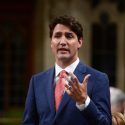Mortgage Fraud Heightens Alongside Housing Prices
Data released from Equifax Inc., a credit reporting agency reveals that mortgage fraud has increased in Canada as soaring home prices in certain markets have driven out buyers and drawn the attention of money launderers.
According to Equifax, since 2013, the number of mortgage applications that could be potentially fraudulent has increased 52 percent. Most of the mortgage fraud applications have come from Ontario and British Columbia, the center of home prices surge in the most recent years.
The company which is responsible for maintaining credit reports on consumers and businesses, gathers information on suspected mortgage fraud from banks, lenders and mortgage insurers who have signaled suspicious applications.
Tara Zecevic, Equifax vice-president of customer insight, stated that some examples of fraud comprises of prospective home buyers submitting fake or altered employment letters, bank statements or tax returns in order to acquire a large mortgage; also, money laundering and identity theft.
“It could be investing in the market as a way to cleanse money. It could be: ‘I really want that home and I’m getting into a bidding war and even though I make $60,000, I’m going to say that I make $90, 000,’” she said. “What ends up happening is consumers think: ‘I’m not really doing anybody any harm.’”
Approximately 90 percent of all mortgage applications flagged for suspected fraud have been derived from banks rather than other mortgage lenders, mostly because banks have improved their skills at detecting fraud attempts.
Home buyers finances have been drained by surging housing prices in markets such as Toronto and Vancouver, including several moves made by Ottawa that have complicated the ability to qualify for an insured mortgage.
As a result, buyers have been pressurized to change their mortgage applications in order to loan approvals.
“I definitely think there is this fear of a continuous rise in the cost of homes, that home ownership is starting to become out of reach,” Ms. Zecevic said.
An online survey showed that 84 percent of Canadians felt the country’s real estate market had become too expensive for first-time buyers. 20 percent of those who were not home buyers complained that they worry they may not be able to save enough for a down payment.
13 percent of Canadians told Equifax that it was alright to tell “little white lies” on their mortgage applications; 16 percent thought mortgage fraud a “victimless crime”. About 8 percent confessed to actually falsifying information on their credit applications.
Cases of mortgage fraud were high in the markets that are the most attractive to foreign buyers.
This could be partly because Toronto and Vancouver, which are hot markets have drawn the attention of those looking to launder overseas money through Canada’s housing market. However, it could also be due to the fact that demand from foreign investors is pressuring local buyers to alter their mortgage applications details in order to better compete for a home.
“It may not be a direct link,” Ms. Zecevic said. “It is a question mark, because we don’t necessarily know how much foreign investment is in the [housing] market.”
About 67 percent of mortgage applications flagged down for fraud were from Ontario, much larger than from any other province, including British Columbia, a province responsible for 12 percent of suspected mortgage fraud.
Ms. Zecevic claimed that although both markets have witnessed home prices increase since 2013, the British Columbia government’s recent moves to reduce foreign investment and speculation in the Metro Vancouver housing market have calmed home sales in the province and also moved attention eastward.
“It’s just making the Ontario market that much more attractive.”





